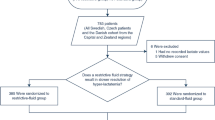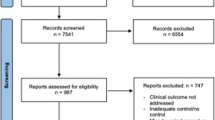Abstract
Postoperative plasma lactate clearance has been established as an important prognostic factor for liver resection morbidity and mortality. The aim of this study was to analyse continuous monitoring of plasma lactate in patients submitted to extended hepatectomy (EH) with special attention to those who received preoperative portal vein branch embolization (PVE) to augment the future remnant liver. In this single center retrospective study, a full revision of 45 medical records was performed from patients who underwent EH at ISMETT from October 1999 to August 2013. Plasma lactates from admission to ICU to day 5 were recorded. Postoperative lactate clearance (ΔLAC) was defined as lactate at postoperative day 5 minus lactate at ICU presentation (hour 0). ΔLAC was analysed in relation to total hospital stay and 90 days’ perioperative morbidity and mortality, using Clavien–Dindo classification, and by presence or absence of PVE. Forty-one right and four left EH were performed. 17 patients underwent previous PVE with a mean of 44 ± 28.9 days-to-surgery time and a 24 ± 8.3 % degree of hypertrophy. In 39 cases (86.7 %), a malignant etiology was the indication for EH, length of surgery was 486 ± 122 min with a median of 300 ml of blood transfusion. In 25 patients, a Clavien grade IIIa or worst complication has been experienced, and in three cases the death occurred during the first 3 months after EH. The median length of hospitalization was 11 days. In patients with preoperative PVE a significative association with an early post-resectional lactate clearance was obtained (p 0.01). Conversely, the univariate analysis measured by t test did not show any significative associations between ΔLAC and a median time of hospital stay longer than 11 days (p 0.08), or the onset of any complications (p 0.67) and of a Clavien’s grade of complications ≥IIIa patients (p 0.48). After adjusting for co-variables, results of the multivariate logistic regression analyses confirmed that ΔLAC is not independent or significant predictor for initial poor liver function following EH. In our single center experience, the continuous monitoring of postoperative lactate clearance did not work as an early marker of postoperative liver dysfunction following EH. Although lactate clearance, worked as guide having a clinical utility in the ICU statement for hemodynamic optimization and systemic fluid balance management.
Similar content being viewed by others
References
Gruttadauria S, Doria C, Luca A, Vizzini G, Scotti Foglieni C, Scott VL, Marino IR (2002) Lactate levels in open interstitial thermal ablation for liver tumors. J Exp Clin Cancer Res 21(2):171–176 (PMID: 12148673)
Chiolero R, Tappy L, Gillet M, Revelly JP, Roth H, Cayeux C, Schneiter P, Leverve X (1999) Effect of major hepatectomy on glucose and lactate metabolism. Ann Surg 229:505–513
Watanabe I, Mayumi T, Arishima T, Takahashi H, Shikano T, Nakao A, Nagino M, Nimura Y, Takezawa J (2007) Hyperlactemia can predict the prognosis of liver resection. Shock 28(1):35–38
Vitale A, Burra P, Frigo AC, Trevisani F, Farinati F, Spolverato G, Volk M, Giannini EG, Ciccarese F, Piscaglia F, Rapaccini GL, Di Marco M, Caturelli E, Zoli M, Borzio F, Cabibbo G, Felder M, Gasbarrini A, Sacco R, Foschi FG, Missale G, Morisco F, Svegliati Baroni G, Virdone R, Cillo U, Italian Liver Cancer (ITALICA) group (2014) Survival benefit of liver resection for patients with hepatocellular carcinoma across different barcelona clinic liver cancer stages: a multicentre study. J Hepatol. doi:10.1016/j.jhep.2014.10.037 ([Epub ahead of print] PubMed PMID: 25450706)
Vitale A, Huo T, Cucchetti A, Lee YH, Volk M, Frigo AC, Cescon M, Tuci F, Pinna AD, Cillo U (2014) Survival benefit of liver transplantation versus resection for hepatocellular carcinoma: impact of MELD score. Ann Surg Oncol. doi:10.1245/s10434-014-4099-2 ([Epub ahead of print] PubMed PMID: 25234023)
Donadon M, Costa G, Cimino M, Procopio F, Fabbro DD, Palmisano A, Torzilli G (2015) Safe hepatectomy selection criteria for hepatocellular carcinoma patients: a validation of 336 consecutive hepatectomies. The BILCHE Score. World J Surg 39(1):237–243. doi:10.1007/s00268-014-2786-6 (PubMed PMID: 25217112)
Gruttadauria S, Marino IR, Vitale CH, Mandala L, Scott VL, Doria C (2002) Correlation between peri-operative serum lactate levels and outcome in pancreatic resection for pancreatic cancer, preliminary report. J Exp Clin Cancer Res 21(4):539–545 (PMID: 12636100)
Pietsch UC, Herrmann ML, Uhlmann D, Busch T, Hokema F, Kaisers UX, Schaffranietz L (2010) Blood lactate and pyruvate levels in the perioperative period of liver resection with Pringle maneuver. Clin Hemorheol Microcirc 44(4):269–281. doi:10.3233/CH-2010-1276
Meguro M, Mizuguchi T, Kawamoto M, Nakamura Y, Ota S, Kukita K, Ishii M, Tatsumi H, Hirata K (2013) Continuous monitoring of central venous oxygen saturation predicts postoperative liver dysfunction after liver resection. Surgery 154(2):351–362. doi:10.1016/j.surg.2013.04.039 (Epub 2013 Jun 18)
Rahbari NN, Reissfelder C, Koch M, Elbers H, Striebel F, Büchler MW, Weitz J (2011) The predictive value of postoperative clinical risk scores for outcome after hepatic resection: a validation analysis in 807 patients. Ann Surg Oncol 18(13):3640–3649. doi:10.1245/s10434-011-1829-6 (Epub 2011 Jun 15)
Nanashima A, Sumida Y, Abo T, Tanaka K, Takeshita H, Hidaka S, Yano H, Sawai T, Obatake M, Yasutake T, Nagayasu T (2007) Clinicopathological and intraoperative parameters associated with postoperative hepatic complications. Hepatogastroenterology 54(75):839–843
Pagano D, Spada M, Cintorino D, Li Petri S, Ricotta C, Bonsignore P, Maruzzelli L, Caruso S, Vizzini G, Gruttadauria S (2014) Evolution of surgical technique in conventional open hepatotectomy for living liver donation over a 12-year period in a single center transplant proceedings. Transplant Proc 46(7):2269–2271. doi:10.1016/j.transproceed.2014.07.034 (PMID: 25242767)
Pagano D, Spada Parikh V, Tuzzolino F, Cintorino D, Maruzzelli L, Vizzini G, Luca A, Mularoni A, Grossi P, Gridelli B, Gruttadauria S (2014) Liver regeneration after liver resection: clinical aspects and correlation with infective complication. World J Gastroenterol 20(22):6953–6960 (ISSN 1007-9327)
Scilletta R, Pagano D, Spada M, Mongiovì S, Pesce A, Portale TR, Guardabasso V, Puleo S, Gruttadauria S (2013) Comparative analysis of the incidence of surgical site infections in patients with liver resection for colorectal hepatic metastases after neoadjuvant chemotherapy. J Surg Res. doi:10.1016/j.jss.2013.11.1092 (PMID: 24398304)
Strasberg SM (2005) Nomenclature of hepatic anatomy and resections: a review of the Brisbane 2000 system. J Hepatobiliary Pancreat Surg 12(5):351–355 (PubMed PMID: 16258801)
Martin MJ, Fitz Sullivan E, Salim A, Brown CV, Demetriades D, Long W (2006) Discordance between lactate and base deficit in the surgical intensive care unit: which one do you trust? Am J Surg 191(5):625–630
Schumann R, Bonney I, McDevitt LM, Cooper JT, Cepeda MS (2008) Extent of right hepatectomy determines postoperative donor albumin and bilirubin changes: new insights. Liver Int 28(1):95–98 (Epub 2007 Oct 9)
Mullen JT, Ribero D, Reddy SK, Donadon M, Zorzi D, Gautam S, Abdalla EK, Curley SA, Capussotti L, Clary BM, Vauthey JN (2007) Hepatic insufficiency and mortality in 1,059 noncirrhotic patients undergoing major hepatectomy. J Am Coll Surg 204(5):854–862 (discussion 862-4. Epub 2007 Feb 15)
Cavaliere F, Conti G, Costa R, Masieri S, Antonelli M, Proietti R (2008) Intensive care after elective surgery: a survey on 30-day postoperative mortality and morbidity. Minerva Anestesiol 74(9):459–468
Wrighton LJ, O’Bosky KR, Namm JP, Senthil M (2012) Postoperative management after hepatic resection. J Gastrointest Oncol 3(1):41–47. doi:10.3978/j.issn.2078-6891.2012.003
Gertsch P, Vandoni RE, Pelloni A, Krpo A, Alerci M (2007) Localized hepatic ischemia after liver resection: a prospective evaluation. Ann Surg 246(6):958–964
Erdogan D, Busch OR, Gouma DJ, van Gulik TM (2009) Morbidity and mortality after liver resection for benign and malignant hepatobiliary lesions. Liver Int 29(2):175–180. doi:10.1111/j.1478-3231.2008.01806.x (Epub 2008 Jun 18)
Martin J, Blobner M, Busch R, Moser N, Kochs E, Luppa PB (2013) Point-of-care testing on admission to the intensive care unit: lactate and glucose independently predict mortality. Clin Chem Lab Med 51(2):405–412
Stockmann M, Lock JF, Riecke B, Heyne K, Martus P, Fricke M, Lehmann S, Niehues SM, Schwabe M, Lemke AJ, Neuhaus P (2009) Prediction of postoperative outcome after hepatectomy with a new bedside test for maximal liver function capacity. Ann Surg 250(1):119–125. doi:10.1097/SLA.0b013e3181ad85b5
Schroeder RA, Marroquin CE, Bute BP, Khuri S, Henderson WG, Kuo PC (2006) Predictive indices of morbidity and mortality after liver resection. Ann Surg 243(3):373–379
Meguro M, Mizuguchi T, Kawamoto M, Nishidate T, Ishii M, Tatsumi H, Kimura Y, Furuhata T, Hirata K (2014) Highest intraoperative lactate level could predict postoperative infectious complications after hepatectomy, reflecting the Pringle maneuver especially in chronic liver disease. J Hepatobiliary Pancreat Sci 21(7):489–498. doi:10.1002/jhbp.87 (Epub 2014 Jan 27)
Conflict of interest
None.
Author information
Authors and Affiliations
Corresponding author
Rights and permissions
About this article
Cite this article
Pagano, D., Tropea, A., Cintorino, D. et al. The unreliability of continuous postoperative lactate monitoring after extended hepatectomies: single center experience. Updates Surg 67, 33–37 (2015). https://doi.org/10.1007/s13304-015-0284-5
Received:
Accepted:
Published:
Issue Date:
DOI: https://doi.org/10.1007/s13304-015-0284-5




